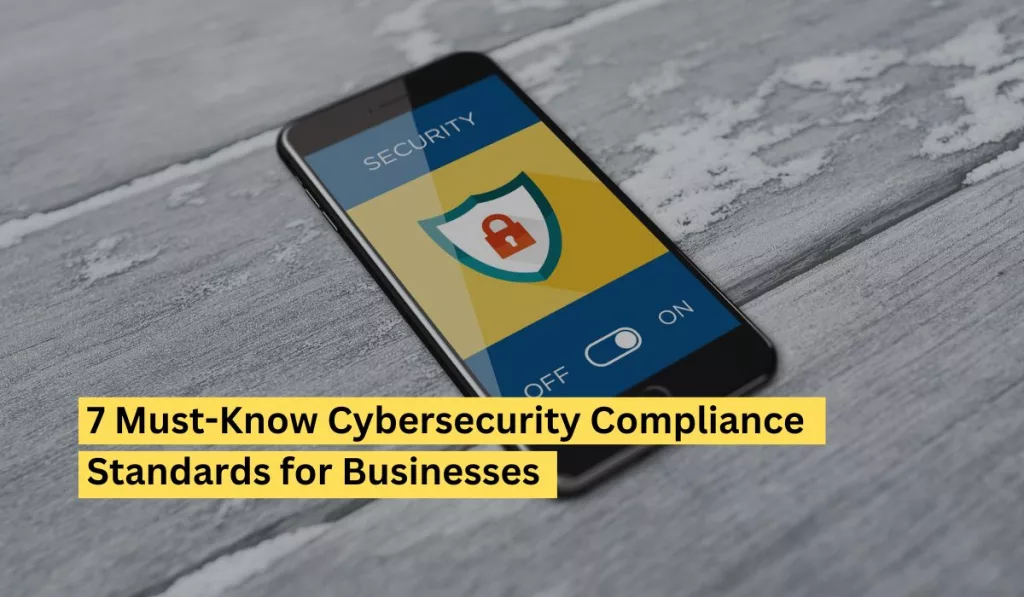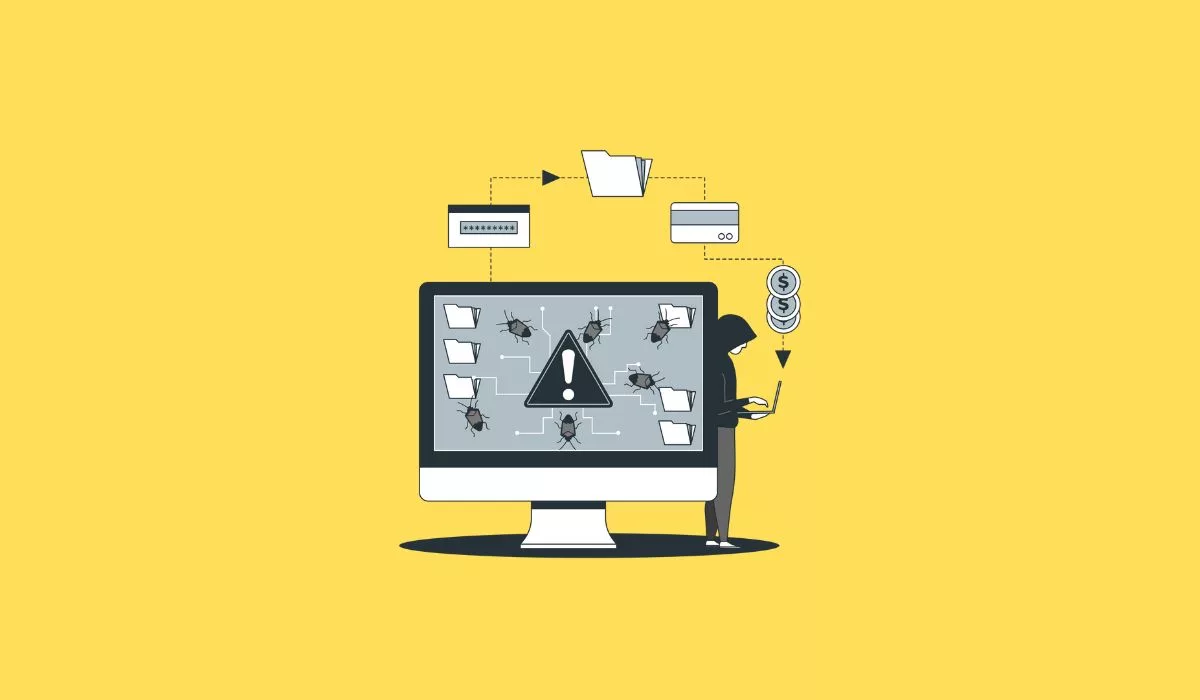Cybersecurity compliance is crucial for businesses to safeguard sensitive data, maintain customer trust, and adhere to regulatory requirements. Failure to comply can lead to legal consequences, financial losses, and reputational damage. Implementing cybersecurity compliance standards ensures that organizations mitigate risks effectively and protect themselves from cyber threats.

Here is the list of 7 must-know cybersecurity compliance standards for businesses:
- 1. PCI DSS (Payment Card Industry Data Security Standard):
- 2. HIPAA (Health Insurance Portability and Accountability Act):
- 3. GDPR (General Data Protection Regulation):
- 4. ISO 27001:
- 4. NIST Cybersecurity Framework:
- 5. SOC 2 (Service Organization Control 2):
- 6. FISMA (Federal Information Security Management Act):
1. PCI DSS (Payment Card Industry Data Security Standard):
The Payment Card Industry Data Security Standard (PCI DSS) is an internationally recognized set of security standards established to enhance payment card data security and reduce fraud risks associated with card transactions. It applies to organizations that handle credit card transactions, including merchants, financial institutions, and service providers.
PCI DSS consists of 12 requirements encompassing various aspects of data security, such as maintaining a secure network, protecting cardholder data, implementing strong access control measures, regularly monitoring and testing networks, and maintaining an information security policy. Compliance with PCI DSS helps businesses build trust with customers, avoid financial penalties, and protect their reputation.
Also read: Cyber attack: Exploring the consequences of data privacy breaches
2. HIPAA (Health Insurance Portability and Accountability Act):
The Health Insurance Portability and Accountability Act (HIPAA) is a federal law enacted in 1996 to establish national standards for protecting individuals’ sensitive health information. It aims to improve the efficiency of the healthcare system by standardizing electronic healthcare transactions and ensuring the privacy and security of patients’ medical records.
HIPAA applies to covered entities, including healthcare providers, health plans, and healthcare clearinghouses, and mandates strict guidelines for the handling and safeguarding of protected health information (PHI). The law includes provisions to restrict the disclosure of PHI to unauthorized parties and sets national standards for the security of electronic protected health information (ePHI). HIPAA compliance is essential to protect patient privacy, prevent data breaches, and avoid legal penalties.
Also, have an eye on 5 Tips To Safeguard Quality and Security in Data Asset Governance
3. GDPR (General Data Protection Regulation):
The General Data Protection Regulation (GDPR) is a comprehensive data protection law enacted by the European Union (EU) to safeguard the privacy and personal data of individuals within the EU and the European Economic Area (EEA). Implemented on May 25, 2018, GDPR imposes strict regulations on how organizations collect, process, and store personal data, aiming to enhance individuals’ control over their information.
GDPR applies to businesses and entities that handle the personal data of EU residents, regardless of the organization’s location, and mandates stringent requirements for data protection, including obtaining explicit consent for data processing, ensuring data accuracy, and providing individuals with rights to access, rectify, and erase their personal data.
Non-compliance with GDPR can result in severe penalties, including fines of up to €20 million or 4% of the organization’s global annual revenue, whichever is higher. Achieving GDPR compliance is crucial for organizations to mitigate risks, maintain trust with customers, and avoid legal consequences.
Also have a look at Key Questions to Prioritize Privacy in Vendor Risk Management
4. ISO 27001:
ISO/IEC 27001 is an internationally recognized standard for Information Security Management Systems (ISMS). It provides a systematic approach to managing sensitive company information, ensuring its confidentiality, integrity, and availability. ISO 27001 sets out requirements for establishing, implementing, maintaining, and continually improving an ISMS, helping organizations identify and mitigate information security risks.
The standard promotes a risk-based approach, emphasizing the importance of assessing and treating security risks effectively. Compliance with ISO 27001 demonstrates an organization’s commitment to information security, enhancing trust with stakeholders and customers. Achieving ISO 27001 certification is widely recognized as a benchmark for information security excellence, providing competitive advantages and demonstrating compliance with legal and regulatory requirements.
Also read: Tips To Safeguard Quality and Security in Data Asset Governance
4. NIST Cybersecurity Framework:
The NIST Cybersecurity Framework is a set of guidelines, best practices, and standards developed by the National Institute of Standards and Technology (NIST) to help organizations manage and improve their cybersecurity risk management processes. It provides a structured approach for organizations to assess and enhance their cybersecurity posture, focusing on key areas such as identifying, protecting, detecting, responding to, and recovering from cybersecurity threats and incidents.
The framework is voluntary and offers a flexible and adaptable framework for organizations of all sizes and sectors to strengthen their cybersecurity defenses. By following the NIST Cybersecurity Framework, organizations can better understand their current cybersecurity posture, identify gaps, prioritize investments, and establish a comprehensive cybersecurity program.
Also read: Why Integrated Technology is Important for Company Data Security
5. SOC 2 (Service Organization Control 2):
SOC 2, short for Service Organization Control 2, is a compliance standard that evaluates a service provider’s systems and controls concerning security, availability, processing integrity, confidentiality, and privacy. It ensures that service organizations manage and protect data securely.
SOC 2 reports are essential for organizations that outsource services and need assurance about the security of their data. The examination involves an independent auditor assessing the service provider’s adherence to trust service criteria, providing valuable insights into their controls and processes. SOC 2 compliance demonstrates a commitment to data security and helps build trust with customers, partners, and stakeholders.
6. FISMA (Federal Information Security Management Act):
The Federal Information Security Management Act (FISMA) is a United States federal law enacted in 2002. It establishes a comprehensive framework to protect government information, operations, and assets against cybersecurity threats. FISMA mandates federal agencies to develop, implement, and maintain information security programs, including risk management processes, security controls, and continuous monitoring practices.
The law requires agencies to conduct annual security assessments, report on their compliance status, and address identified vulnerabilities to ensure the effectiveness of their security measures. FISMA aims to enhance the security posture of federal information systems and promote the confidentiality, integrity, and availability of sensitive government data. Compliance with FISMA is crucial for government agencies to safeguard their information assets and ensure public trust in their operations.
Final thoughts
Implementing cybersecurity compliance standards is essential for businesses to protect sensitive data, maintain customer trust, and adhere to regulatory requirements. Failure to comply can result in legal consequences, financial losses, and reputational damage. By adhering to these standards, organizations can mitigate risks effectively and safeguard themselves from cyber threats.










Leave a Reply